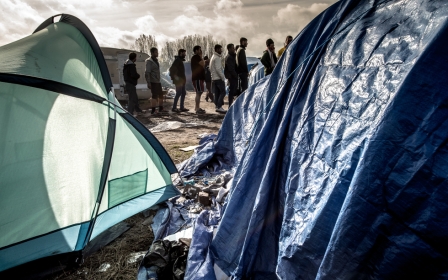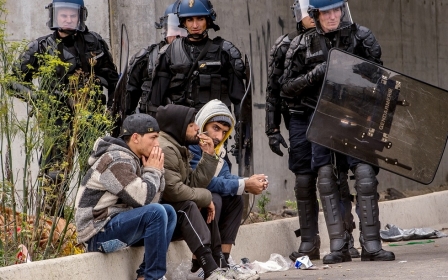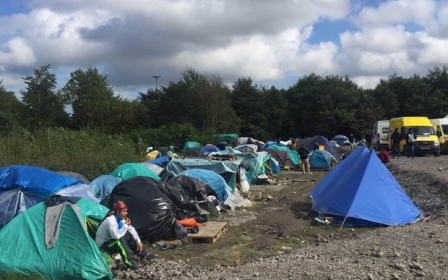Emptying the Jungle: Internal transfers of refugees in France to intensify

"Last Tuesday at 7pm, we were taken there. We were seven Syrian nationals. It was an inappropriate place to keep refugees [...]. The next day, we were taken to the airport by bus and from there to a remote place, almost two hours by plane."
On Tuesday, 20 October, Mahmoud (pseudonym), a Syrian refugee in his 50s, was arrested on a train to London. First transferred to the administrative detention centre (CRA) of Coquelles, a town near Calais, he was then transferred by air to the CRA of Nimes, 1006 kilometers away, without being provided with any information regarding the destination or the purpose of the transfer.
Alone in France, he would like to go to England, and once there, he plans to bring his wife and seven children. While he doesn’t want to reveal where they are now, he is proud of repeating that they all speak English.
Reached by phone in Calais, where he returned, Mahmoud describes the conditions of his transfer: "They didn’t treat us humanely. They took us to a private plane, the one with the red stripes on the sides, I saw it on TV."
This aircraft is "Air sans pap’" - short for “Sans Papiers" (without documents), referring to the undocumented illegal immigrants - as nicknamed by StreetPress. The magazine revealed on 19 October that a private jet, leased for 1.5 million euros per year, was used for the past six months to transfer refugees or migrants from the camp in Calais ("Jungle") to France’s administrative detention centres.
Their aim is to clear the ‘Jungle’
These transfers have taken place for years. Until now, there were only a few cases per week, but today the private jet has turned into a freighter. Some 47 people were welcomed by the Association Forum Refugies (Forum Refugees) at the Nimes CRA last week. According to an internal source, 22 Syrians, Sudanese, Iraqis, Iranians, Afghans and Eritreans were transferred there on Tuesday at midday, and 24 others, of the same nationalities, were also expected to be transferred that night.
The Nimes CRA is overwhelmed. There are now 71 detainees, while there are only 66 available places. Under normal conditions, the centre welcomes an average of 30 persons. According to an internal source, the police force in charge of the centre is powerless. There is no translator, and the centre is understaffed. The situation is unmanageable for them.
Nimes is one example among many others. On the same day, 50 refugees and migrants arrived in Mesnil’s CRA, 50 in Toulouse, 50 in Rouen, 47 in Metz and 40 in Marseilles. 433 people have found themselves in Mahmoud’s position in a period of just two weeks.
The transfers were decided by the Pas-de-Calais prefecture, the stated objective being to bring the pressure down in Calais. Four to five thousand people live in the Jungle, a refugee and migrants camp that has existed for 20 years. The situation is now unbearable. Access to water, sanitation and healthcare is extremely limited, and tension is rising in the camp.
"The camp is out of control," said Pierre Henry, general director of France Terre d'Asile, an organisation active in CRAs. "There is no doubt that the camp must be dismantled.” But transferring refugees is, according to him, of a “highly questionable effectiveness,” as well as a “stupid and useless” measure.
'A misuse of powers'
Pierre Henry describes transfers in those condemning terms as most of the transferees are released at the prefectures’ request or by a court order within a maximum of five days, and once released, they take the first train back to Calais, as did Mahmoud.
For Lucie Feutrier Cook, assistant director in charge of the Order of Malta’s migrants division, which also operates in the French CRAs, the measure is a "misuse of the original purpose of detention, which also affects people who are already in very precarious conditions and could benefit from international protection”.
She explains that the aim of detention is to proceed (if the judiciary affirms) to the expulsion of the person from the territory. The person will be freed in France if the arrest is not carried out properly or if the profile does not fit. If it does, the person will be deported to their homeland or another country.
Administrative detention usually involves people who are potentially subject to deportation.
While most of the refugees and migrants affected by transfers from Calais have been notified to leave the territory, none has yet been deported. Additionally, this is impossible for many refugees involved: the Syrians, among others, cannot be sent back to their homeland. Unless they are referred to another European country, they have no country to which they can travel legally.
"[They] might use it as a form of intimidation and insecurity," says Feutrier-Cook.
According to an internal source, the refugees who arrived Tuesday to the CRAs were extremely exhausted, without personal belongings and without knowing why they were being transferred.
For Jean-Louis Galland, judge of freedoms at the Nimes High Court, the measure is considered as a deprivation of liberty. Last Friday, following the arrival of 47 refugees in the city, he decided, on his own initiative and against his superiors’ advice, to investigate these transfers. According to him, the aim of the detention is not deportation but only a transfer of people, who should not be in CRAs.
A strong critic of the prefecture of Pas-de-Calais, Galland stated that "applying retention procedure for purposes other than the removal of a foreign person out of the national territory is a misuse of powers that has the effect of unduly depriving that foreign person of their freedom”.
In response, he decided to release all those transferred from Calais. The Prosecutor of Nimes High Court appealed against the decision that was cancelled due to jurisdictional defect. The refugees were finally released on Monday on the basis of their conditions of arrest or their personal circumstances, except for three of them. Almost all those released returned to Calais.
England must ‘take its share of refugees’
Abdul Ismail, a 20-year-old Libyan, was on a train to London when he was arrested. "We were told that we were entering a restricted area and that we had no right to be there [...]. But at the court [Nimes High Court], they said it wasn’t a restricted area and we should have been allowed to leave."
Abdul, a Libyan from Tawergha, was with Mahmoud at the Nimes CRA. He left his city in the aftermath of the revolution. "People considered us supporters of Gaddafi and attacked us. My aunt and uncle died." He arrived in Calais via Greece and Italy. Arrested and detained for five days in Coquelles’s CRA, he was then transferred to Nimes.
Abdul decided to apply for asylum in France, in Lyon. Most refugees do not want to apply for asylum in France. Their goal remains England, but England does not welcome them.
In August 2015, an agreement signed between France and Britain allowed the latter to fortify its border. The agreement’s purpose is primarily to secure the Channel Tunnel to prevent refugees and migrants from using it as a travel route, thus risking their lives. "More barriers, more resources and more sniffer dog teams" were promised by the British Prime Minister David Cameron to support the police at the French borders.
"Britain has outsourced its border on French soil," said Pierre Henry from France Terre d'Asile. "If we want to bring the pressure down [in Calais], it is necessary to give migrants who wish so the possibility to be granted asylum and, on the other hand, get Britain to uphold its responsibility and take its fair share of refugees."
Asked about this criticism, the UK Home Office (Ministry of Interior) responded by email: "Britain takes directly refugees in camps in Lebanon and Syria precisely because we do not want them taking a hazardous trip across the Mediterranean Sea."
As for the French authorities, questions arising about increasing measures of internal transfer of refugees remain unanswered. The Pas-de-Calais prefecture and the French Ministry of Interior have not responded to repeated requests made by Middle East Eye for interview.
All interviews were conducted by telephone.
Translated from French by Ali Saad
New MEE newsletter: Jerusalem Dispatch
Sign up to get the latest insights and analysis on Israel-Palestine, alongside Turkey Unpacked and other MEE newsletters
Middle East Eye delivers independent and unrivalled coverage and analysis of the Middle East, North Africa and beyond. To learn more about republishing this content and the associated fees, please fill out this form. More about MEE can be found here.





